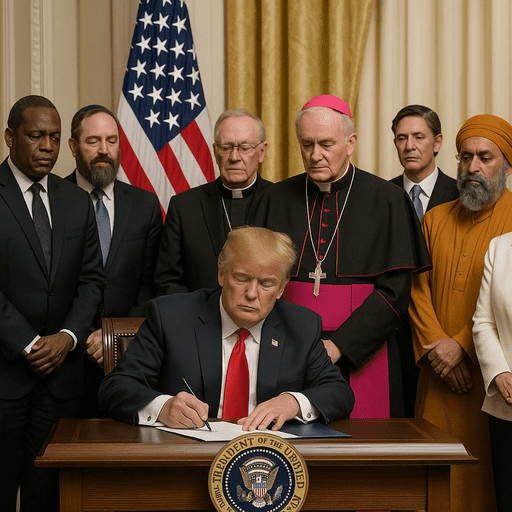On May 1, 2025, President Donald Trump signed an executive order to establish the Religious Liberty Commission during the National Day of Prayer. This initiative aims to investigate and promote policies that protect religious freedom across the United States. The Commission is tasked with reporting on threats to religious liberty and celebrating America’s religious pluralism. It is set to conclude on July 4, 2026, unless extended.
Lieutenant Governor Dan Patrick chairs the Commission, joined by notable figures such as Dr. Ben Carson, Dr. Phil McGraw, and Pastor Paula White. The Commission’s composition reflects a commitment to addressing concerns pertinent to faith-based communities, particularly those advocating for traditional values.
The Commission’s mandate includes:
– **Assessing Threats to Religious Liberty**: Identifying and documenting instances where religious freedoms may be at risk.
– **Promoting Policies to Protect Faith-Based Rights**: Recommending legislative or administrative actions to safeguard religious practices.
– **Celebrating Religious Pluralism**: Highlighting the diverse faith traditions that contribute to the nation’s cultural fabric.
While the Commission’s focus is on protecting religious freedoms, some observers note that its membership predominantly represents evangelical perspectives. This composition may lead to a narrower interpretation of religious liberty, potentially overlooking the concerns of other faith groups. Additionally, the Commission’s activities could intersect with existing federal agencies, possibly leading to overlapping responsibilities and the need for increased coordination.
The establishment of the Religious Liberty Commission underscores the administration’s dedication to upholding faith-based rights. As the Commission begins its work, it will be essential to monitor its progress and ensure that its efforts effectively address the diverse needs of all religious communities. With time and appropriate resources, the Commission is expected to fulfill its mandate and contribute to the ongoing dialogue on religious freedom in the United States.
—
Julie Harris covers faith, family, and values-based policy. She holds a journalism degree from Hillsdale College and began her reporting career covering religious liberty cases at the state level. With a strong grounding in moral philosophy and cultural reporting, she brings depth and clarity to complex legislative debates surrounding life and faith.



